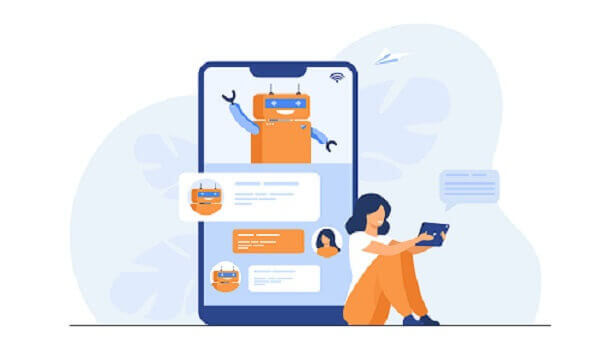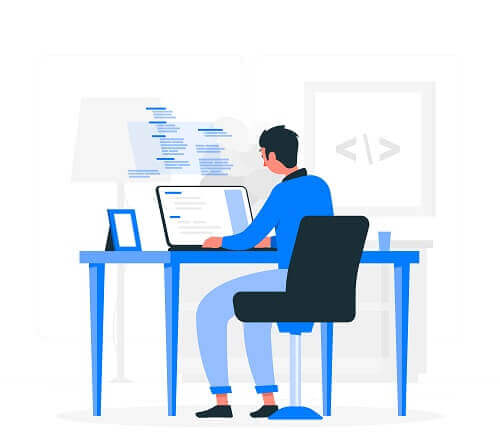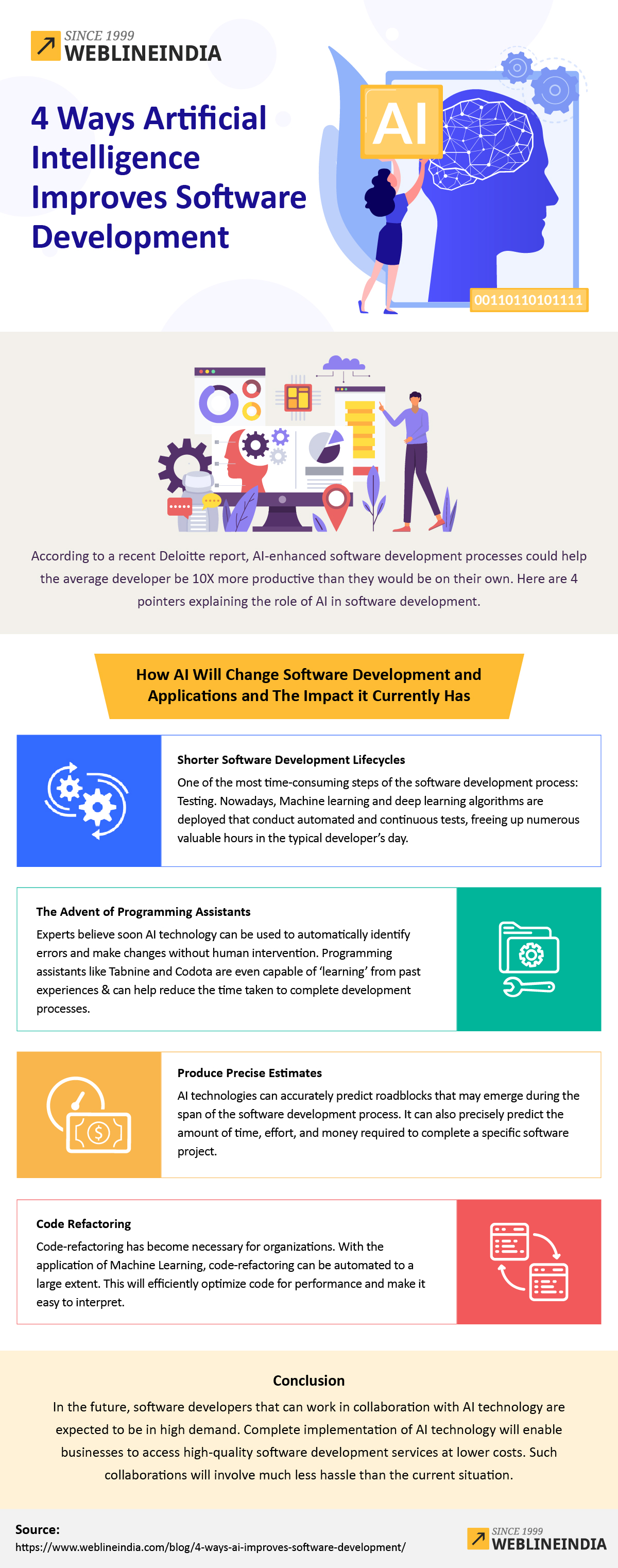Artificial Intelligence (AI) has moved beyond experimentation into becoming a core driver of modern software development. In 2025, AI is more than just a support tool. It actively reshapes application development approaches, accelerates coding, automates testing, and optimizes delivery pipelines. Organizations adopting AI see faster time-to-market, lower costs, and more resilient applications.
At the same time, questions about the impact of AI on jobs, developer productivity, and business transformation dominate conversations.
In this blog, we’ll explore how AI is improving software development, the role of generative AI, job market changes, and why companies worldwide are rethinking their technology strategies.
Artificial Intelligence and Software Development
To state that AI in software development is changing different aspects of a developer’s life will be an understatement, in fact, according to a recent Deloitte report AI-enhanced software development processes could help the average developer be 10X more productive than they would be on their own.
Today’s reality is that artificial intelligence (AI) technology is being actively applied in different industries and is improving business efficiencies across the globe.
In other words, AI technology has already, for numerous industries, brought a revolution in how things are done, and the software development industry is no exception.
In fact, the software development industry may be one of the industries where AI technology may have already started a complete revolution. As more and more innovative applications are explored, it is expected that AI technology will completely change the way developers write and maintain code.
Some experts, like Pete Warden, an author, a scientist, and a Google research engineer, believe that thanks to machine learning and AI technologies, the software jobs of the future will not even involve programming.
While this notion is a matter of debate, it provides a realistic insight into the magnitude of AI technology’s impact in software development.
AI-Enhanced Software Development: What It Means Today
AI-enhanced software development combines machine learning, natural language processing, and generative AI tools to change how applications are built. Instead of relying solely on manual coding, AI now supports developers in almost every stage of the lifecycle.
- Smarter code completion: Developers can type a few words of natural language instructions, and AI models instantly suggest full blocks of optimized code, ensuring accuracy while reducing repetitive effort. This not only saves time but also minimizes syntax errors.
- Automated bug detection: Instead of finding issues late in QA, AI tools scan code in real time, flagging performance or security vulnerabilities as they appear, helping teams deliver cleaner, more stable applications.
- AI-powered testing: Testing has historically been a bottleneck in development. AI-enhanced tools can automatically generate unit and integration test cases to ensure comprehensive coverage and reducing human oversight.
- Knowledge-based recommendations: Developers working on complex architectures can rely on AI systems trained on thousands of projects, giving them immediate insights into best practices, frameworks, and reusable components.
When these capabilities are integrated, AI doesn’t just assist developers; rather, it transforms them into supercharged problem solvers, capable of delivering high-quality software at record speed.
How AI is Changing Application Development Approaches
Traditional application development relies heavily on structured methodologies like Agile or DevOps. While effective, they are time-consuming. AI introduces data-driven and predictive models that optimize decision-making and execution across all stages.
- Data-driven development: AI analyses past usage data, customer behavior, and error logs to help teams prioritize features that users actually want, aligning product roadmaps more closely with business outcomes.
- Predictive analytics: Instead of guessing where systems may fail, AI models forecast performance bottlenecks, scalability issues, or likely downtime, allowing teams to fix problems before they impact end-users.
- Automated documentation: Documentation often slows down projects. AI can auto-generate architecture diagrams, API usage guides, and user manuals directly from code, saving countless hours and improving communication between stakeholders.
- Continuous improvement feedback loops: AI-driven monitoring tools track app performance post-launch, generating recommendations for updates, patches, and new features, ensuring apps remain competitive and reliable long after deployment.
This evolving relationship between AI projects and application development approaches shows that AI is embedded as the central nervous system of modern development.
Advantages of Generative AI in Software Development
Generative AI is one of the most disruptive advancements, enabling machines to create content, designs, and even fully functional code bases. For developers, this is a game-changer.
- Code generation: Instead of manually typing every function, developers describe requirements in plain language, and AI instantly produces the underlying code. This significantly shortens project timelines and reduces human errors.
- Rapid prototyping: Generative AI can create app wireframes and functioning prototypes in hours, enabling businesses to validate ideas faster and iterate on user feedback without burning budgets on lengthy development cycles.
- Cross-platform adaptability: Once an app is designed, generative AI tools automatically optimize it for web, mobile, and cloud environments. This ensures consistent performance across all user touchpoints without manual rewriting.
- Creative feature ideation: AI models trained on global projects can propose innovative features that developers may not have considered. This inspires new functionalities that improve competitive advantage.
Companies unlock faster releases, smarter innovations, and lower costs by adopting generative AI to make it one of the strongest competitive differentiators in 2025.
Impact of AI on Developer Productivity and Jobs
A common question in every boardroom is: “Will AI replace developers?” The answer is nuanced. AI is transforming developer roles, not eliminating them. Instead of fearing AI, developers should embrace it as a partner technology that multiplies their effectiveness and ensures long-term career growth.
- Jobs affected by AI: Entry-level coding, routine QA testing, and manual bug tracking are being automated. These roles face reduced demand as AI systems can perform repetitive tasks faster and more accurately.
- Jobs enhanced by AI: Senior developers, architects, and full-stack engineers now leverage AI to automate grunt work and focus on higher-level challenges like system design, optimization, and innovation. AI doesn’t erase these jobs—it amplifies their value.
- Developer productivity boost: AI improves developer productivity by 30–40%, according to industry data. Teams complete more features in less time, with fewer bugs and reduced technical debt, leading to faster delivery cycles.
- Reskilling opportunities: The rise of AI has created new roles such as AI model trainers, prompt engineers, and ethical AI consultants, ensuring that skilled developers have more career pathways than before.
How AI Will Change Software Development and Applications and The Impact it Currently Has
Shorter Software Development Lifecycles
A software development process consists of several steps. Unfortunately, many of these steps are quite time-consuming, making the entire process of developing market-ready software slow.
Now, this process may not necessarily be slow, but the market demands often require software development teams to work with almost unrealistic deadlines. This is where machine learning, deep learning, and AI in software become important.
While there is still some time before AI is integrated into the entire software development process, many teams across the globe have already started using deep learning and machine learning to speed up one of the most important yet most time-consuming steps of the software development process: testing.
Traditionally, software tests aimed at finding bugs before the deployment stage had to be run manually. This was not just time-consuming but also involved an enormous scope of human error. As a result, many users would find bugs in the software after being rolled out to the market.
Nowadays, software testing is completely different. Machine learning and deep learning algorithms are deployed that conduct automated and continuous tests, freeing up numerous valuable hours in the typical developer’s day. It is also worth noting that using machine learning and deep learning algorithms allows software development teams to test more scenarios and find more bugs, minimizing the chances of a paying user finding a bug.
In other words, AI-enabled software testing allows development teams to cut down development time and still reduce their failure rate and produce a bug-free product.
The Advent Of Programming Assistants

AI-powered virtual assistants are finding applications in a variety of industries, including development. Unfortunately, modern software developers have to read and seek references from lengthy documentation and spend an unrealistic amount of time debugging code.
Programming assistants can help reduce the time taken to complete such processes. Modern programming assistants, such as Codota for Java and Kite for Python, offer superb time-saving features such as just-in-time recommendations and help, autocomplete features for code, and even code examples. Another AI coding assistant is Tabnine, an AI-powered code completion tool that supports over 30 programming languages. Tabnine is perhaps one of the most popular AI-powered development assistants, with over one million active users.
Programs like Tabnine and Codota are even capable of ‘learning’ from past experiences. With this ability, these tools can identify possible errors and highlight them in real time when the development process is underway. Experts believe soon AI technology can be used to automatically identify errors and make the necessary changes without human intervention.
Also read our related post on Software Development Outsourcing
Produce Precise Estimates
It’s no secret that AI technologies possess the ability to ‘learn’ from data that is fed to them. This ability is being actively used to produce budget and timeline estimates for software development projects. Not surprisingly, the estimates produced are incredibly precise.
In order to produce a realistic prediction, an in-depth understanding of context and subject matter expertise. Both of these things can be ‘taught’ to an AI. As a result, AI technologies can accurately predict roadblocks that may emerge during the span of the software development process. It can also precisely predict the amount of time, effort, and money required to complete a specific software project.
This ability to produce accurate estimates has serious implications. For instance, this can help development agencies plan the number of software projects they can take and adjust their pricing accordingly. In addition, this may result in a better experience for the clients of development agencies as they will be able to start projects with realistic expectations that are highly likely to be met in the future.
AI in Software Development helping in Code Refactoring

In order to efficiently migrate to better technologies, maintaining a clean code is critical. However, it is a challenging task in today’s development landscape, when multiple contributors are collaborating on the same software projects. As a result, most software projects pass through multiple hands, even in the maintenance stage.
As a result, code-refactoring has become necessary for organizations that want to move to newer and better technologies. This time-consuming and difficult task is being made easier and more efficient with the help of Machine Learning technology. By leveraging AutoML, code refactoring processes can be significantly automated, enhancing performance and improving code readability.
Challenges and Limitations of AI in Software Development
While AI is revolutionizing software development, it also comes with its share of challenges and limitations that must be addressed to ensure responsible and effective integration.
AI models often inherit biases from training data, leading to flawed predictions and unfair outcomes, impacting code quality and reliability. While AI aids code generation, human oversight remains crucial for adherence to standards, security, and ethical practices. Also, high computational demands and integration challenges increase costs and complicate workflows, especially for smaller organizations. Experts also suggest that overreliance on AI risks may reduce developer skills and create security vulnerabilities.
By addressing these challenges through thoughtful implementation, collaboration, and ethical considerations, developers and organizations can fully leverage the potential of AI in software development while mitigating its risks.
AI Tools and Platforms in Software Development
The adoption of AI in software development is largely driven by the availability of advanced tools and platforms that streamline processes, enhance productivity, and enable innovative solutions. From assisting with code generation to automating testing, these tools are transforming how developers approach software creation.
Key AI Tools and Platforms Supporting Developers
1. GitHub Copilot
GitHub Copilot, powered by OpenAI’s Codex, acts as an AI-powered coding assistant. It provides context-aware code suggestions, auto-completes functions, and even generates boilerplate code, saving developers significant time during the coding process.
2. Tabnine
A widely popular AI coding assistant, Tabnine supports over 30 programming languages. By learning from user-specific projects, it delivers precise code predictions and helps reduce repetitive coding tasks.
3. IBM Watsonx Code Assistant
IBM Watsonx Code Assistant brings enterprise-grade AI support to developers. It focuses on generating code snippets, automating documentation, and improving team collaboration by offering reliable and scalable solutions.
4. TensorFlow and PyTorch
TensorFlow and PyTorch are leading frameworks in the realm of machine learning and deep learning. These tools provide robust libraries for building and training neural networks, enabling the development of AI-driven applications with complex functionality.
5. Generative AI for Coding
Generative AI tools leverage natural language processing (NLP) to help developers create code from plain language descriptions. These tools simplify the development process, making it more accessible for non-technical users.
6. Automated Testing Platforms
AI-powered testing platforms enable continuous testing by automatically generating and executing test cases. These platforms can simulate user scenarios, identify bugs, and optimize test coverage, reducing the time required for manual testing.
7. Cloud-Based Machine Learning Platforms
Platforms like Google Cloud AI and Amazon SageMaker provide developers with scalable AI and machine learning tools. They allow developers to train, deploy, and monitor AI models in the cloud, reducing infrastructure costs and complexities.
8. No-Code/Low-Code Platforms
AI-powered no-code and low-code platforms are democratizing software development. By offering drag-and-drop interfaces and pre-built templates, these platforms enable faster prototyping and development without requiring extensive coding expertise.
9. Interpretable Models
For developers working on critical applications, interpretable AI models help ensure transparency. These models explain their decision-making processes, improving trust and accountability in software systems.
How AI Tools Are Shaping the Future of Development
Developers can focus on creative and strategic aspects of software development while automating repetitive and mundane tasks by leveraging these AI tools and platforms. This not only accelerates the development process but also improves the quality and scalability of the final product.
From GitHub Copilot’s intelligent suggestions to TensorFlow’s powerful machine-learning capabilities, AI tools are becoming indispensable in modern software development. Their integration ensures developers can meet market demands with speed, precision, and innovation.
Conclusion
While AI technology is expected to revolutionize the way code is written completely; it will not mean that coders and professionals working as software developers will become obsolete. It simply means that the core responsibilities of developers will transform to aid the application of the emerging outsource AI technology. In the future, software developers that can work in collaboration with AI technology are expected to be in high demand. Complete implementation of AI technology will enable businesses to access high-quality custom software development services at lower costs. Such collaborations will involve much less hassle than the current situation.
Frequently Asked Questions
The following are some of the good effects of AI on software development:
– Gathering requirements
– Organises software development
– Development is streamlined
– Helps with testing
– Deployment is simplified
– Maintenance is reduced
– Increases security
The following are some of the ways AI will change software development:
– The software’s design will be simplified
– Project management will be effortless
– Debugging will be automatic
– Control over the deployment process
– Automating tests
Yes, with the help of self-coded applications, AI can address coding challenges. This will not only allow programmers to complete work in less time, but it will also improve the developer’s programming ability.
AI will have an impact on the software development business in the following ways:
– Improved data security
– Detection of bugs and errors at an early stage
– With strategic decision-making, you can create superior software
– The estimates’ precision will be improved
AI will result in a significant increase in productivity. AI will assist software developers in developing higher-quality applications more quickly and efficiently. It will not only save organisations time and effort, but it may also lead to more inventive business procedures.
Social Hashtags
#softwaredevelopment #aiinsoftware #ai #artificialintelligence #aiinsoftwaredevelopment #softwaredevelopmentprocess #softwaredevelopers #aitechnology #coderefactoring #programmingassistants #softwaredevelopmentlifecycles
4 Ways AI Improves Software Development: INFOGRAPHIC

Testimonials: Hear It Straight From Our Global Clients
Our development processes delivers dynamic solutions to tackle business challenges, optimize costs, and drive digital transformation. Expert-backed solutions enhance client retention and online presence, with proven success stories highlighting real-world problem-solving through innovative applications. Our esteemed Worldwide clients just experienced it.
Awards and Recognitions
While delighted clients are our greatest motivation, industry recognition holds significant value. WeblineIndia has consistently led in technology, with awards and accolades reaffirming our excellence.

OA500 Global Outsourcing Firms 2025, by Outsource Accelerator

Top Software Development Company, by GoodFirms

BEST FINTECH PRODUCT SOLUTION COMPANY - 2022, by GESIA

Awarded as - TOP APP DEVELOPMENT COMPANY IN INDIA of the YEAR 2020, by SoftwareSuggest